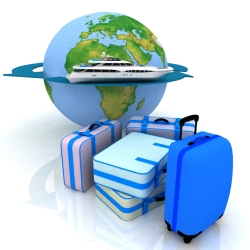 More doctors are jumping ship to work abroad, but uncharted waters present new risks, argues Sara Williams.
More doctors are jumping ship to work abroad, but uncharted waters present new risks, argues Sara Williams.
Suitcase in one hand and passport in the other, Dr Ashley Leadbeatter, an F2 from Leeds, walks through the doors of Heathrow Airport to check in for his one-way flight to Australia. As he stands surveying the queue of faces ahead of him, he wonders how many of them are doctors, like him, travelling to the unknown in search of fortune and glory.
Ashley will be working in Gold Coast Hospital in South Port, Queensland. So why did he leave? “It is the sensible time to leave, as specialist training is a treadmill that is difficult to get off. If I went later, it would interrupt my training and it would be harder to return. In February I had been a doctor for 20 months; in the UK system I had to decide on what specialty I wanted to do for the rest of my life. I want more life experience before I make that decision.”
Ashley is not alone. The GMC has issued 2,266 Certificates of Good Standing so far this year, which is a standard requirement before embarking on clinical work in most countries, and is an indication of how many doctors are going to work abroad. Although the DH could not provide any figures, Remedy UK predicts that the numbers will be significantly higher than last year because of problems with training.
Dr Clare Cooke moved to New Zealand last October because she was frustrated with the MMC “fiasco”. “When I was a third year SHO in a busy DGH in the Home Counties, I realised that nothing fazed me anymore; I was working on autopilot. I moved to the Antipodes and found jobs that are without parallel in the UK. You could run a base hospital, work in a clinic 1,000 km from the nearest tertiary referral centre, cruise with the flying doctors, act up a grade, make life and death decisions, and gain infinite clinical skills and life experience.”
Thinking ahead
Clare left the UK confident that she could achieve her dreams of working as a foreign doctor, but she now knows only too well the number of boxes she had to tick to realise them. From expensive medicals to police checks, it can take a long time to secure a ticket to work in another country. Thinking ahead is the key to organising a successful trip – getting important factors like travel insurance, flights, vaccinations and professional indemnity sorted early will help avoid problems at the last minute.
Indemnity
Before practising protect yourself: new countries mean new risks. Having a patient’s best interests at heart will not always protect that patient from harm. Likewise the best intentions will not always protect a doctor from human error and professional scrutiny. This is why having indemnity and access to 24-hour medicolegal advice is vital.
NHS indemnity is limited to clinical negligence claims arising from NHS hospital care and the claim is made against the trust. It is essential for all doctors to have additional professional protection for the other medicolegal risks which can arise from practice. The NHS scheme does not extend to doctors working abroad, who will therefore need to make their own arrangements to ensure that they have adequate protection.
Dr Pallavi Bradshaw, MPS Medicolegal Adviser, says that when concerns are raised, having the reassurance that someone will support you and protect your professional interests is invaluable. “Junior doctors must be alive to the ever-increasing risks of clinical practice. Doctors travelling abroad should be alert to the current legal and ethical climate within a particular country. Being aware and managing these risks will safeguard you for the future.
“Without a doubt, patients should be protected, but equally, we believe, so should doctors. MPS’s role is to protect the interests of members when concerns are raised about their practice, in any form – claim, complaint, medical council investigation. It is a common misconception that MPS deals mostly with clinical negligence claims. This kind of work represents only about 20% of our caseload.”
Clare Wolstenholme is Team Leader for the International Membership Department at MPS. She urges junior doctors to take advantage of overseas membership, as MPS now operates in more than 40 countries. “Some countries have state or government indemnity, but it is usually limited to negligence claims, so it is advised that doctors retain their MPS membership whilst working overseas. Members should contact the membership department with details of their scope of practice and where they intend to work, so we can confirm the correct subscription rate for their work.”
Off the beaten track
The Antipodes is a mecca for graduates from all trades, but Clare Cooke argues that a lot can be gained from exploring far-away places. “It depends on who you are, your seniority, your outlook on life and your breadth of experience, but if you really want to, go for it and get a great experience.”
Different countries have different requirements for the type of indemnity provision which are acceptable. For example, in Germany and Australia, it is a legal requirement that doctors are indemnified through a contract of insurance and discretionary indemnity is not recognised in these areas. MPS does not offer membership in USA and Canada, or countries operating under their jurisdictions. But it does offer membership for voluntary work overseas for organisations such as Voluntary Services Overseas (VSO), and those who accompany travel groups and expeditions.
MPS’s protection allows members to request assistance with medicolegal problems arising from Good Samaritan Acts in any part of the world. This is where a doctor provides medical assistance outside their usual clinical employment or work environment in a bona fide medical emergency, such as when passing a roadside accident, emergencies at public events and on aeroplanes.
Useful links
Talk to a membership adviser before travelling, if you are planning to work overseas. Use the helpline number 0845 718 1787, or email [email protected].



